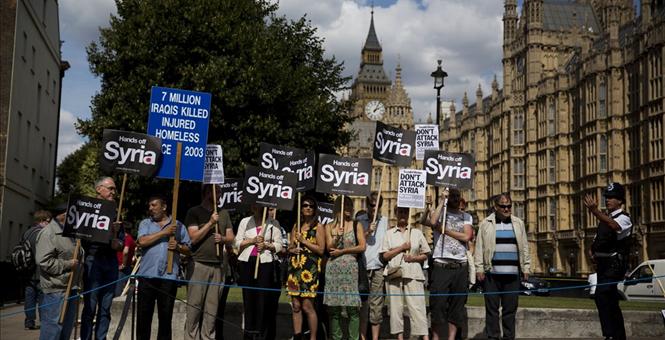In a world in which what’s happening is analyzed and dissected, chewed up and spat out, before it even happens, there is, in fact, a surprising amount of surprise.
Consider recent days. With the U.S. poised to strike Syria for its government’s alleged and apparent use of chemical weapons, suddenly we learn that the British House of Commons has denied the British government authorization to join the U.S. in the strike, a virtually unheard of event. No one, at least on this side of the pond, seems to have told the Obama administration that a possibility was actually a probability.
Suddenly realizing the risks of going it alone, Obama surprises even his close advisers, to say nothing of the pundits, by not announcing the strike on Syria that he was supposed to announce, but rather that he will seek authorization from the Congress even though there is a good chance he won’t get it.
With the Obama administration cursing Russia throughout for its unwillingness to deal with Syria, Putin suddenly announces that he will work with the U.S. to persuade Syria to give up its stock of chemical weapons, at which point Obama asks Congress to hold on taking a vote. In a bizarre twist, the New York Times prints an op-ed from Putin, full of insults but also insights, saying that America is a danger to the world. It does so under the remarkable headline: ‘A plea for caution from Russia.’
Impossible, improbable, but all considered, a most interesting sequence of events that, at least for the moment, has turned despair into hope.
The British people and the American people — from empire past to empire present — are demonstrably anti-war, which is no small matter. That’s good news that has probably caught a lot of us by surprise. Foreign policy is a matter for the experts, the elites, and the people, the unwashed, are supposed to go along. Not only are they not going along, but in a surprising outburst of democracy, those hoary institutions, the elected legislatures, are actually representing their views. That hasn’t received enough comment, given that maybe it’s the biggest surprise of all.
Granted some of the anti-war support in America is not from your usual suspects. The populist right, the Tea Party in particular, is hardly the pacifist left, but it wants less government spending, including on the military and wants America to mind its own business.
On the matter presently before us, let their voices be heard and their votes tallied. Motives aren’t everything. And America does have a tradition of isolationism which it has managed to bury since 1945. A bit of it, even quite a lot of it, could be good for America and for the world.
Enter Putin, a brute, a bigot and a loud mouth, with his crude sense of the melodramatic. But bullies sometimes speak a truth or two and need to be listened to. “It is alarming,” says Putin, conjuring up Afghanistan and Iraq, “that military intervention in internal conflicts has become commonplace for the United States.” How many of us, including many Americans (think Noam Chomsky), have not said as much? “We must,” he writes, “stop using the language of force,” which is quite a concession for a bully.
Putin proceeds to make a point, not uncommon to American scholarship but rarely voiced in the mainstream media. In explaining why America must do something given what Assad has done, Obama says that American willingness to do this is “what makes America different. It’s what makes us exceptional.” Putin takes strong exception to this claim of exceptionalism: “It is extremely dangerous to encourage people to see themselves as exceptional, whatever the motivation.”
“We are all different,” Putin reminds us, but, in an apparent reference to the custom of American presidents to end every speech with “God bless America,” he acidly observes “but when we ask for the Lord’s blessings we must not forget that God created us equal.” Ouch, that hurts.
Meanwhile, though the killing in Syria proceeds, the U.S. and Russia have already reached a framework agreement on getting rid of the humungous Syrian stockpile of chemical weapons. There’s still a long way to go, but Obama’s ambivalence and Putin’s truculence and candour have created an opening for diplomacy to do what seemed impossible only days ago. It is always possible that one opening could lead to another and somehow end the slaughter. Our best hope is for more good surprises.
Mel Watkins is Professor Emeritus of Economics and Political Science at the University of Toronto. He is Editor Emeritus of This Magazine and a frequent contributor to Peace magazine. He is a member of Pugwash Canada and former President of Science for Peace. Watkins is recipient of the 2008 inaugural Galbraith Prize in Economics and Social Justice awarded by the Progressive Economics Forum.
Photo: townhall.com




